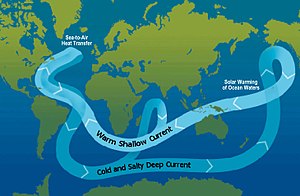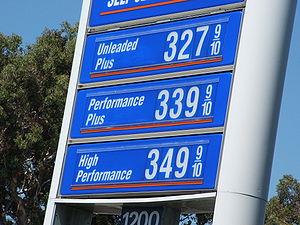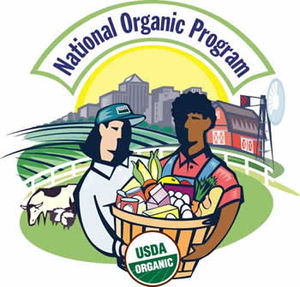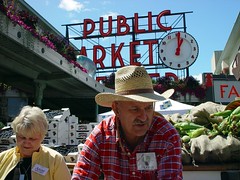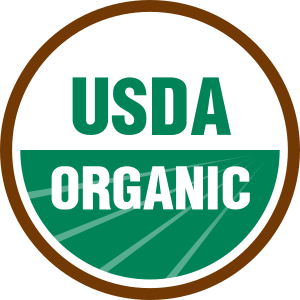 Image via WikipediaAlthough global warming is an issue that is widely debated, it is an issue that still causes concern. For example, the predictions state that the weather will become more erratic in the future (hence the recent shift in terminology away from "global warming" and towards "climate change," which is a more relatable way to describe the effects of global warming - which may not seem all that "warm" to some of us). We may experience horrific coastal flooding and drought will become (and is already becoming in some areas) a big concern. In 2005, Hurricane Katrina struck the Gulf Coast and this storm is not one that we will ever forget. In the summer and fall of 2007, southern states, such as Georgia and Tennessee experienced life changing drought conditions, which resulted in the strict enforcement of water bans and water restrictions.
Image via WikipediaAlthough global warming is an issue that is widely debated, it is an issue that still causes concern. For example, the predictions state that the weather will become more erratic in the future (hence the recent shift in terminology away from "global warming" and towards "climate change," which is a more relatable way to describe the effects of global warming - which may not seem all that "warm" to some of us). We may experience horrific coastal flooding and drought will become (and is already becoming in some areas) a big concern. In 2005, Hurricane Katrina struck the Gulf Coast and this storm is not one that we will ever forget. In the summer and fall of 2007, southern states, such as Georgia and Tennessee experienced life changing drought conditions, which resulted in the strict enforcement of water bans and water restrictions.Even if you do not be sure whether you believe in the concept of global warming, you may still be concerned with the changes that you are seeing. The good news is that there are a large number of ways that you can help. If you are interested in doing your part to help stop or lessen the impact of global warming or even just improve the environment, you will first want to start in your own home.
Since carbon dioxide and other greenhouse gases are a big cause of global warming or at least the rise in the earth’s temperature in general, we need to limit these emissions from our home. One of the biggest ways to do so is to turn down your heat. Even a few degrees can make a huge difference with the toxins that are emitted from our homes. Simply put on a sweatshirt or invest in a thermostat with a programmable timer. A programmable timer will enable your homes temperature to be lower when you are not there, but you can set it to turn your heat on right before you arrive home from work.
 Image via WikipediaIt may also be a good idea to have your home updated or at least inspected by a professional. Many individuals have no idea how much heat escapes from their home. This is most often caused by poor insulation or leaky window seals. If it seems that your house cannot get warm enough, no matter how high the heat is, you likely have a problem that needs to be addressed. Although it will cost you money to reinsulate your home or to repair your windows, these repairs should pay for themselves over time, due to a reduction in heating costs.
Image via WikipediaIt may also be a good idea to have your home updated or at least inspected by a professional. Many individuals have no idea how much heat escapes from their home. This is most often caused by poor insulation or leaky window seals. If it seems that your house cannot get warm enough, no matter how high the heat is, you likely have a problem that needs to be addressed. Although it will cost you money to reinsulate your home or to repair your windows, these repairs should pay for themselves over time, due to a reduction in heating costs.It is also important to examine your electricity use. The less electricity you use, the better it will be for the environment. In fact, did you know that by reducing your electricity use, you can not only help to save the environment and combat global warming, but you can also save yourself a considerable amount of money each year? You can. Ways that you can reduce electricity in your home include switching all or most of the light bulbs in your home to energy efficient ones, and using energy efficient appliances, as well as making sure that all lights and appliances are turned off when they are not in use. Many appliances also use some energy even when turned off (these are often called "vampires"). To combat this, plug appliances into a power strip, and simply switch the strip off every time you turn off your appliances.
Other additional ways that you can help to stop the affects of global warming and help the environment in general involves limiting your dishwasher use and putting a hot water heater blanket on your heater. Hot water heater blankets are affordably priced and they are designed to keep your heater insulated. When properly used, hot water heater blankets can enable you to lower the temperature. This can also save you time running the water (another savings), as well as reduce the emissions from your home. As for your dishwasher, only run it when you have a full load and hand wash any dishes that you may need right away. This simple step can also help to save you money, especially over time.
The above mentioned easy steps are just a few of the many simple ways that you can take to join the fight against global warming. While it is important to remember that our homes are not the only cause of carbon dioxide emissions, we must all start somewhere. What better place then inside our homes?

